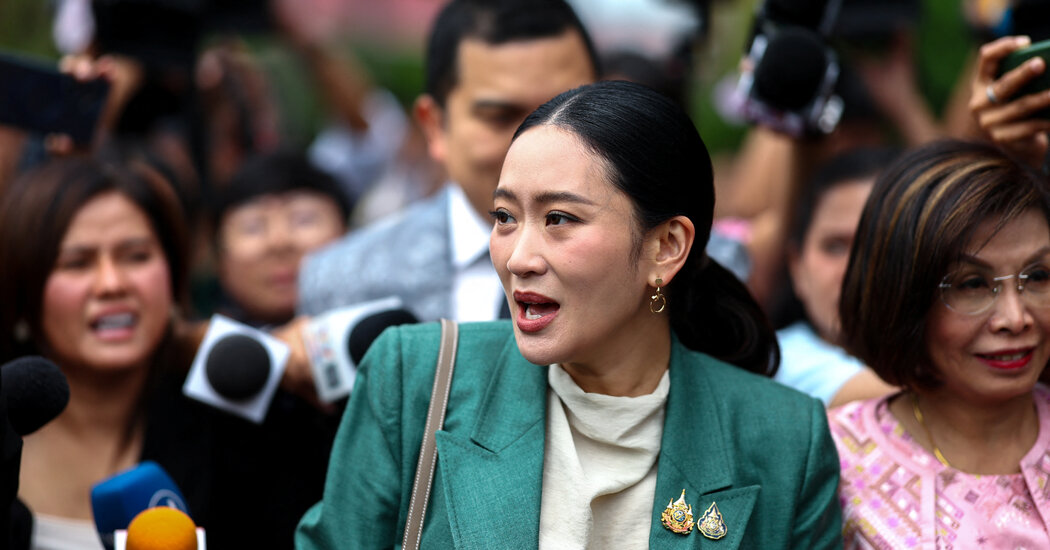A Thai court suspended the prime minister on Tuesday, plunging the country into fresh political turmoil as a border dispute with Cambodia has heated up.
Paetongtarn Shinawatra, 38, the scion of a powerful and polarizing Thai political dynasty, is fighting for her political survival less than a year after taking office. Her crisis began last month when the Cambodian leader Hun Sen made public a private conversation they had about the border tensions.
In the recording, Ms. Paetongtarn appeared to be deferential to Mr. Hun Sen and disparaging of her own country’s powerful military. Her perceived tone set off an uproar in Thailand, leading to calls for her to resign and a defection from her governing coalition. She apologized, but thousands of protesters took to the streets in Bangkok, stoking fears of a coup.
In a petition to the Constitutional Court, a group of senators sought the removal of Ms. Paetongtarn, accusing her of violating ethics standards in her talks with Mr. Hun Sun. On Tuesday, the court agreed to consider the complaint and suspended her with immediate effect.
Ms. Paetongtarn said she accepted the court’s decision and would soon present her case.
“I will try to prove that my intention and effort was more than 100 percent for the country,” she told reporters. She also apologized again, saying the conversation with Mr. Hun Sen was not for her personal gain.
Ms. Paetongtarn has few options on how to proceed, said Isra Sunthornvut, who heads the Thailand office of Vriens & Partners, a government affairs consultancy. One path is to resign, he said, while the second is to dissolve Parliament and call for new elections.
“Or No. 3, which is the most terrible, is military intervention,” he said. “But with the Constitutional Court coming in, I wouldn’t see a reason for the military to intervene.”
It is the latest upheaval in Thailand, which has suffered from long stretches of political uncertainty in recent years.
Thailand has been mired in a cycle of coups and protests for decades, with the royalist-military establishment exerting its will against threats to the status quo. Since the early 2000s, the military has twice overthrown democratically elected governments linked to Thaksin Shinawatra, Ms. Paetongtarn’s father.
In the 2023 election, voters emphatically rejected military rule. But the party that won the most ballots was blocked from forming a government and was eventually disbanded.
Months after the election, Mr. Thaksin’s Pheu Thai Party took power. An ally, Srettha Thavisin, became prime minister, but, less than a year later, was removed by the Constitutional Court over an ethics complaint. He was succeeded by Ms. Paetongtarn.
The roots of the current crisis lie in tensions with Cambodia that have flared occasionally over the decades. In a brief skirmish in May, a Cambodian soldier was killed, and the relations between the two neighbors quickly deteriorated to the lowest point in years.
Ms. Paetongtarn and Mr. Hun Sen spoke to each other on June 15, aided by translators. Ms. Paetongtarn called him “uncle” and offered to “arrange” anything that he wants. She also urged him to ignore “the opposite side,” a reference to the Thai military.
Her comments drew condemnation from lawmakers, both those in her coalition and in the opposition, who all called on Ms. Paetongtarn to resign. The second-largest member of her governing coalition, the Bhumjaithai Party, quit her alliance earlier last month. Quickly, the legal challenges against Ms. Paetongtarn piled up.
It remains unclear how long the court will take to reach a verdict on Ms. Paetongtarn’s fate. But she has been given 15 days to defend herself against the charge, the court said in a statement.
In the interim, Suriya Jungrungruangkit, the deputy prime minister, is set to be appointed the acting prime minister, according to the Secretariat of the Cabinet.
For now, Ms. Paetongtarn is trying to hold on to at least one other title: On Tuesday, she appointed herself culture minister, though she has not been sworn in to the role.
There is precedent in Thailand for suspended prime ministers to be returned to the role. In 2022, the court suspended Prayuth Chan-ocha, the general who ousted Ms. Paetongtarn’s aunt, Yingluck Shinawatra, in a coup, while it considered a petition to remove him from office for overstaying his term. He was restored to the job in five weeks.
But even if she returns to office, Ms. Paetongtarn has precious little political capital. A poll conducted last month showed that her approval rating had plummeted to 9.2 percent from 30.9 percent a few months earlier.
Mr. Thaksin, 75, is also facing legal challenges. On Tuesday, he went on trial on a criminal charge of insulting the monarchy, a case that could send him to prison for up to 15 years.
Muktita Suhartono and Kittiphum Sringammuang contributed reporting.
Sui-Lee Wee is the Southeast Asia bureau chief for The Times, overseeing coverage of 11 countries in the region.
The post Thai Court Suspends Prime Minister as Political Crisis Spirals appeared first on New York Times.




